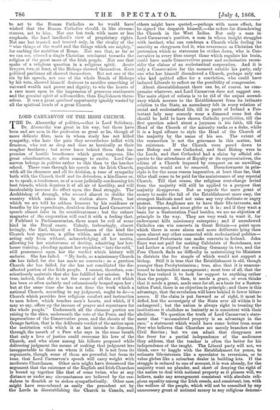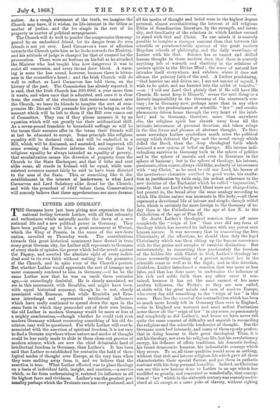LORD CARNARVON ON THE IRISH CHURCH.
THE Dr. Abernethy of politics,—that is Lord Salisbury. Dr. Abernethy was great in his way, but there have been and are men in the profession as great as he, though of more delicate fibre, men in whom study has not killed sympathy, who hate the pain they nevertheless inflict with firmness, who cut as deep and dose as heroically as their rougher brethren ; but never leave behind them that im- pression of hostile beneficence which great surgeons, like great schoolmasters, so often manage to excite. Lord Car- narvon belongs in politics rather to this than to the harsher school. There runs through his speech on the Irish Church, with all its clearness and all its decision, a tone of sympathy both with the Church itself and its defenders, a kindliness or, so to speak, a tenderness, as of a man judicially condemning his best friends, which deprives it of all air of hostility, and will incalculably increase its effect upon the final struggle. The Archbishop of Armagh, who seemed almost to dislike the country which raises him in station above Peers, but which we are told he seldom honours by his residence or benefits by his expenditure, doubtless deems Lord Carnarvon's speech almost false in its considerateness ; but the calmer magnates of the corporation will read it with a feeling that, if Falkland is Parliamentarian, there must be evil of some kind in the Royal cause. Calmly, forbearingly, almost lovingly, the Earl, himself a Churchman of the kind the Church best approves, a pillar within, and not a buttress acting only from without, acknowledging all her merits, allowing for her misfortunes of destiny, admitting her hot- house training, pleading against her expulsion "into the cold," still pronounces upon her the verdict which history will endorse. She has failed. "My lords, as a missionary Church she has failed, for she has made no converts ; as a garrison Church she has failed, for she has not conciliated the dis- affected portion of the Irish people. I cannot, therefore, con- scientiously maintain that she has fulfilled her mission. It is true, indeed, that she is not the cause of all the evil which has been so often unfairly and calumniously heaped upon her ; but at the same time she has not done the work which a national Church, according to my judgment, ought to do—a Church which provides free religious comfort and instruction to men below, which touches men's hearts, and which, if I may so say, offers up the incense of prayer and repentance for the whole people." Underneath all the clamour parties are raising to the skies, underneath the vote of the Peers, and the imprecations of the Conservative press, and the shouts of the Orange faction, that is the deliberate verdict of the nation upon the institution with which it at last intends to dispense, through the mouth of a Peer who says in the same breath that only a love of justice could overcome his love of the Church, and who alone among his fellows proposed while delivering judgment the means of making that judgment less insupportable to those on whom it falls. It is not from its arguments, though some of them are powerful, but from its tone, that Lord Carnarvon's speech will carry weight with moderate Churchmen. Other men might have denounced the argument that the existence of the English and Irish Churches is bound up together Ile that of some twins, who at any distance or under any circumstances are believed by the cre- dulous to flourish or to sicken sympathetically. Other men might have remembered as easily the precedent set by the Lords in disestablishing the Church in Canada, and others might have quoted,—perhaps with more effect, for he signed the despatch himself,—the orders for disendowing the Church in the West Indies. But only a man in Lord Carnarvon's position, a man in whom insight struggles with instinct, who can condemn a Church while feeling its- sanctity as clergymen feel it, who reverences as Christian the. pretension which as statesman he strikes down, who is Con- servative in every fibre except those which regulate his brain, could have made Conservatives pause and ecclesiastics recon- sider the claims of an ecclesiastical corporation. And it is- only a Conservative for the moment outside his party, only one who has himself disendowed a Church, perhaps only one who had quitted office for a conviction, who could have- induced Liberals to reflect on the possibility of compromise.
About clisestablishment there can be, of course, no com- promise whatever, and Lord Carnarvon does not suggest one. The main object of reform is to be rid of the unjust ascend- ancy which accrues to the Establishment from its intimate relation to the State, an ascendancy felt in every relation of social and ecclesiastical life, till in parts of Ireland a Pro- testant lady may scarcely wear a diamond cross lest she should be held to have shown Catholic proclivities, till the first question asked about a juryman is his faith, till the• Head of the Church of the minority ranks as a duke, while it is a legal offence to style the Head of the Church of the majority by the name of his see. The extent of the connection is not the grievance in this matter, but its existence. If the Church were pared down to- one Bishop and one Cathedral, and that Bishop were in the Lords, and that Cathedral had a claim by official eti- quette to the attendance of Royalty or its representatives, the odium of a Church imposed by conquest on an unwilling population would not be removed. Disendowment in prin- ciple is for the same reason imperative, at least thus far, that tithe shall cease to be paid for the maintenance of any especial Church. Till that ceases, the religious rent-charge levied from the majority will still be applied to a purpose that majority disapproves. But as regards the mere grant of money to make the fall of the Establishment more easy, the strongest Radicals need not raise any very obstinate or angry protest. The Anglicans are to have their life-interests, and their parsonages, and some glebe as it is ; and if they want a basis for a Sustentation Fund besides, we see no objection of principle in the way. They are very weak to want it, for endowment kills missionary enterprise ; and if unendowed Catholics can win converts in Great Britain—a point upon which there is more alarm and more deliberate lying than upon almost any other connected with ecclesiastical politics- unendowed Protestants can make converts in Ireland. John Knox was not paid for making Calvinists of Scotchmen, nor had Luther a stipend for rending Germany in two, and the Free Church finds no 'difficulty in maintaining its Ministers in districts the fee simple of which would not support a bishop. Still it is true that the Establishment is old, though younger than Presbyterianism ; true, also, that it is unaccus- tomed to independent management ; most true of all, that the State has trained it to look for support to anything rather- than the people. If, then, it needs a grant, or even thinks that it needs a grant, made once for all, as a basis for a Susten- tation Fund, there is no objection in principle; and there is this advantage, that the revolution will leave behind it fewer bitter- nesses. If the claim is put forward as of right, it must be defied, lest the sovereignty of the State over all within it be endangered ; but the nation is always right in treating the institutions it abolishes as leniently as is consistent with their abolition. We question the truth of Lord Carnarvon's state- ment that "accumulated property is an advantage in the race," a statement which would have come better from some Peer who believes that Churches are merely branches of the Civil Service ; but we can admit that clergymen are the freer for a partial independence of the audiences they address, that the teacher is often the better for his- independence of the taught. The Liberal party will not, we- think, care to haggle with the Establishment for pence, to- estimate life-interests like a speculator in reversions, or to- value glebes like a suburban dealer in building lots. If the- straggle is reduced to one of account, it is won already, for the majority want no plunder, and short of denying the right of the nation to deal with national property as it pleases will, we- believe, make any arrangement consistent with absolute reli- gious equality among the Irish creeds, and consistent, too, with the welfare of the people, whioh will not be consulted by any unnecessary grant of national money to any religious denomi- nation. As a rough statement of the truth, we imagine the Church may have, if it wishes, its life-interest in the tithes as matter of justice, and the fee simple in the rest of its property as matter of pellet-m-1 arrangement. The Church will do well to ponder the compromise thus sug- gested by an undoubted friend, for its danger from its own friends is not yet over. Lord Carnarvon's tone of affection towards the Church quits him as he looks towards the Ministry, and his attitude of judge is changed for that of counsel for the prosecution. There were no buttons on his foil as he attacked the Minister who had taught him how dangerous it was to resist all concession, and every thrust drew blood. A warn- ing is none the less sound, however, because there is bitter- ness in the counsellor's heart ; and the Irish Church will do well to reflect, as Lord Carnarvon has told them, on the history of the past. The Commission has already reported, it is said, that the Irish Church has 200,000/. a year more than it wants, and when once that is admitted, and once it is clear from the result of the elections that resistance cannot save the Church, we leave its friends to imagine the sort of com- promise Mr. Disraeli will persuade his party to bring in, or the amount which will be left to them if the Bill ever comes out of Committee. They can if they please measure it by an equation which will not greatly tax their arithmetical skill. As a seven-pound franchise to household suffrage so will be the terms their enemies offer to the terms their friends will at last be educated to accept. Some principle like religious equality will be declared vital, and will be embodied in a Bill, which will be discussed, and amended, and improved, till some evening the Premier informs the country that by religious equality he always intended an equality of poverty, that secularization means the diversion of property from the Church to the State Exchequer, and that if tithe and rent alike cease, all creeds in Ireland will be equal, while non- existent revenues cannot fairly be said to have been diverted to the uses of the State. This, or something like it, dis- establishment in the interest of landowners, is what Lord Carnarvon and Lord Salisbury alike dread for the Church; and with the precedent of 1867 before them, Conservatives will scarcely believe that these apprehensions are mere dreams.































 Previous page
Previous page